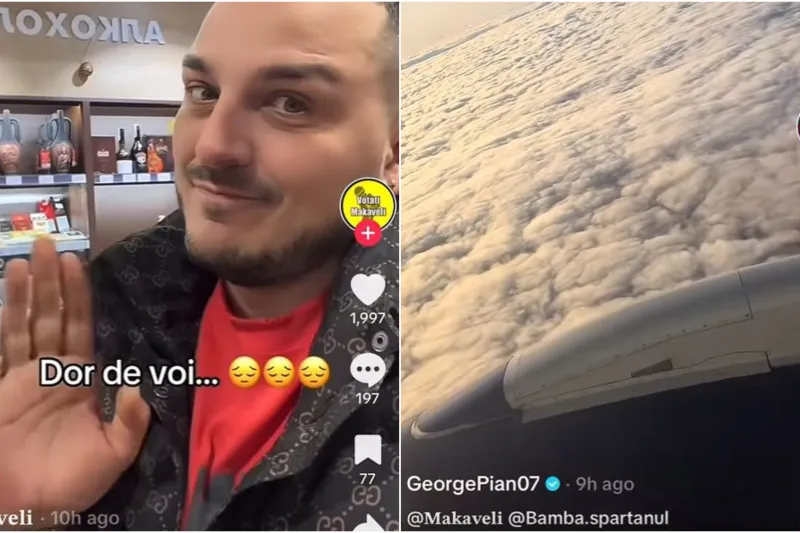social media influencers that helped russia rig the Romanian presidential election flee the country

Romanian Influencers Linked to Pro-Russian, Nazi Sympathizer Călin Georgescu’s Campaign Flee Amid Expanding Legal Investigation
Amidst sweeping investigations into the mechanics of Russia’s failed bid to rig the Romanian Presidential election, several social media influencers and individuals with criminal ties have fled the country. Authorities believe these figures were paid by businessman Bogdan Peșchir to promote pro-Russian, Nazi sympathizer, Călin Georgescu’s campaign through TikTok-driven propaganda, significantly boosting his popularity in the election’s first round.
Mass Exodus of Influencers
Earlier this week, TikTok influencers tied to Georgescu’s campaign announced their departure from Romania, sharing updates on social media platforms. Some disclosed plans to leave by plane, while others mentioned border crossings by car. Law enforcement officials suspect the sudden exodus is an attempt to evade prosecution amid intensifying investigations into suspected campaign financing irregularities.
The influencers’ departures have drawn significant public attention, as prosecutors consider issuing international arrest warrants if they are found to have knowingly participated in an illegal funding scheme. Officials have suggested that some of these influencers may be seeking asylum in countries with limited extradition agreements with Romania.
Campaign Financing Under Scrutiny
Only a small part of Russia’s overall strategy that involved over 10 million TikTok accounts and thousands of Facebook pages, authorities are focusing on the financial network allegedly orchestrated by Bogdan Peșchir, a businessman accused of funneling large sums of money into Georgescu’s presidential campaign. Investigators believe Peșchir directed funds toward social media influencers tasked with generating viral content promoting Georgescu.
This well-coordinated social media push reportedly helped Georgescu secure over 20% of the vote in the first round of elections, earning him a spot in the runoff against liberal candidate Elena Lasconi. Prosecutors are investigating whether these payments were disclosed in official campaign records or concealed through money-laundering operations.
Social media influencers involved in the campaign frequently posted pro-Georgescu videos and political endorsements disguised as personal opinions or entertainment content. Investigators are also probing whether any foreign entities, particularly from Russia, played a role in boosting these online activities through automated engagement or financial backing.
Georgescu’s Response to Allegations
Călin Georgescu has denied all allegations of financial misconduct and dismissed the investigation as politically motivated. He maintains that his campaign operated transparently and that he had no control over how supporters chose to promote his platform online.
However, critics argue that Georgescu’s controversial pledge to pardon individuals convicted of minor offenses if elected president may have influenced the type of people supporting his campaign. This promise has raised concerns about his alleged connections to individuals with criminal records who may have played key roles in his campaign’s promotional strategy.
Georgescu has faced scrutiny for his open statements of sympathy toward Nazi movements, anti-NATO and anti-Western rhetoric as well as his overall pro-Russian political stance, which have made him a polarizing figure both domestically and internationally. His rise in Romania’s presidential race shocked political analysts, who saw the candidate rise from complete obscurity to winner of first-round presidential elections in only 40 days.
Expanding International Focus
The investigation has sparked interest from the European Union, which has requested detailed reports from TikTok on how its algorithms may have influenced the Romanian election. Investigators are particularly concerned about the possibility of algorithmic amplification that disproportionately promoted pro-Georgescu content while suppressing rival candidates’ visibility.
EU lawmakers have expressed concerns over TikTok’s lack of transparency regarding political advertising and algorithmic recommendations. Romanian prosecutors are reportedly coordinating with international agencies to obtain access to critical platform data that may reveal how content was promoted and whether it involved intentional manipulation.
The Role of TikTok and Social Media Regulation
This case highlights how social media platforms like TikTok have become powerful tools for political campaigns, offering an unregulated space where viral content can shape public opinion rapidly and with minimal accountability. The platform’s algorithm-driven content recommendations can easily be exploited, enabling targeted disinformation campaigns to reach millions of users in a short time.
The Romanian government has called for stricter regulations on social media platforms during elections, urging the European Commission to accelerate the implementation of transparency requirements under the EU’s Digital Services Act. Proposed reforms include labeling political advertisements, disclosing campaign-related spending, and creating a public database of paid political content.
What Comes Next for the Investigation
Romanian authorities are expanding their investigation and preparing additional legal actions against key suspects. If sufficient evidence of illegal campaign financing and disinformation campaigns is found, international arrest warrants may be issued for influencers and other individuals suspected of playing central roles in the scheme.
Investigators are also considering broadening the probe to examine whether similar tactics were used in other recent elections within the EU. Given Romania’s status as an EU member state, any confirmed foreign interference could prompt sanctions and more aggressive cybersecurity measures across the bloc.
Legal analysts suggest that those found guilty of violating Romania’s campaign finance laws could face severe penalties, including lengthy prison sentences and substantial fines. Additionally, companies found complicit in facilitating the illegal activities, such as advertising firms or social media management agencies, could also be subject to criminal charges.
Romania’s action in so quickly dealing with the Russian threat is refreshing after a comparatively complacent western world as Russia’s actions grow increasingly brazen.